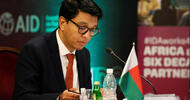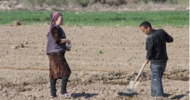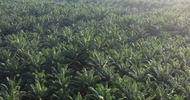Dr Fahd bin Abdulrahman Balghunaim, minister for agriculture for the Kingdom of Saudi Arabia, speaks to This is Africa about the government's strategy in Africa.
- This is Africa
-
08 June 2012
Major agricultural investor in Ethiopia, Saudi Star, has bigger problems there than it might have expected.
- African Agriculture
-
06 June 2012
Karuturi, which has 300,000 ha in Ethiopia, is now targeting the DRC, Tanzania, Mozambique, Senegal and Sierra Leone.
- Business World
-
02 June 2012
The distinctive feature of these land deals that has attracted attention is the speed of the acquisitions, the transparency (lack thereof) of the terms and the scale of the acquisitions and implied investment.
The science and environment author discusses a growing global threat
The U.S. should reassess its support for the government of Ethiopia, amid concern that more than half a million people are being evicted to make land available for foreign investment in agriculture, advocacy groups say.
Obama announces G8's New Alliance for Food Security and Nutrition and reiterates support for the "process and pilot use of the Principles of Responsible Agricultural Investment"
- US government
-
18 May 2012
Ethiopia's State Minister of Industry, Tadesse Hailem, says the investors have expressed interest to invest in the agriculture sector in Ethiopia and export it to their country.
On the ground reports have exposed a secret operation by Ethiopian forces to force the Suri, Bodi and Mursi tribes out of their ancestral land to pave way for sugarcane plantations of Malaysian investors.
- Friends of Lake Turkana
-
16 May 2012
Saudi Arabia is encouraging companies to invest in farms in Africa as the kingdom seeks to secure supplies of food imports to replace local production, said Agriculture Minister Fahd Balghunaim.
- Arabian Business
-
11 May 2012
Ethiopia has made more than 4 million hectares (9.9 million acres) of “fertile and unutilized” land available for agriculture companies that meet government requirements, Prime Minister Meles Zenawi said.
The attack on the Saudi Star Company has served as a pretext for a hunting down of innocent civilians and a campaign of murder, torture, harassment and intimidation in the remote corners of the country, warns Anywaa Survival.
Responding to concerns raised by Friends of the Earth International and others about the impacts of land grabbing, The World Bank claims that land lease deals in developing countries can reduce hunger and poverty, and build sustainable agriculture. The facts tell otherwise.
Sixty years on, controversial agricultural projects are back in fashion in Africa and other parts of the developing world as investors - from foreign governments to wealthy individuals - hunt for land to grow food.
Dalla Al Baraka, a Saudi conglomerate with $5 billion in annual revenue, has acquired two million acres of farmland in eastern Sudan to produce food for export to the Middle Eastern kingdom. While the investors are hoping to wean Saudi Arabia off imports from South America, such agreements cause concern among local Sudanese farmers.
Last week, the Land Matrix "land grab" database was released. On paper, they have a strong methodology and strict criteria about projects to be included. In practice, they seem to violate their own rules, at least when it comes to Chinese "projects" in Africa.
- China Africa Real Story
-
30 April 2012
Indigenous people fear collective retaliation by government security forces.
Discussions with EU officials covered various aspects of human rights violations in Ethiopia with a focus on the large-scale land-lease to local and international commercial farmers, the evictions of Oromo farmers from their homes and farmlands, and the situation of Oromo refugees in the Horn of Africa and Yemen.
Gunmen attacked the camp of an agricultural company owned by a Saudi billionaire in southwest Ethiopia, Federal Affairs Minister Shiferaw Teklemariam said.
- Associated Press
-
29 April 2012
Exploring the fundamental data flaws in the Land Matrix dataset
- Rural Modernity
-
27 April 2012
An international coalition of NGOs and research groups has published the world's largest database of land grab deals struck since 2000, offering unprecedented detail on who's investing, where and what for.
- The Guardian
-
27 April 2012
Some CSOs are using the media to paint an inaccurate and distorted picture of the World Bank Group’s work and they are questioning the motives of the conference, says the World Bank's Klaus Deininger.
Preparation to counter the gathering of 1,000 African Land Buyers who paid an entrance fee of 3,000 dollar at Waldorf Astoria in Manhattan, New York for their conference from April 23 to April 25 is underway.
Governments in the global south are claiming farmland is 'empty' and 'unused' – and flogging it off to foreigners who promise investment. The June summit in Rio needs to call a halt to this.
- The Guardian
-
17 April 2012
India, which doesn’t allow corporate farming domestically, has joined the growing list of countries going overseas to look for food security.
- Asia Sentinel
-
09 April 2012
How corporate transparency encourages secrecy - the counterproductive role of many NGO's.
- Rural Modernity
-
07 April 2012
Ethiopia’s Agriculture Ministry has transferred 100,000 hectares in Benishangul to commercial farmers, and is offering a further 981,000 hectares, about one-fifth of the state’s land.
For millions of indigenous villagers and pastoralists land grabbing means forced relocation, loss of livelihoods, and a death blow to their ancient cultures.
- Huffington Post
-
03 April 2012
Water grabbing refers to situations where powerful actors take control of valuable water resources for their own benefit, depriving local communities whose livelihoods often depend on these resources and ecosystems.
African continent is the new destination for Indian agriculture companies, as more than 80 of them have invested over Rs 10,800 crore in commercial farming activities in under-developed countries of the region.
- Financial Chronicle
-
28 Mar 2012















